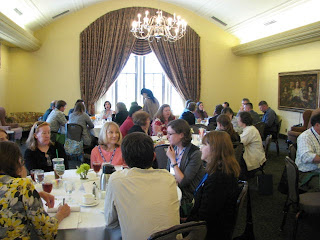From Robin Goettel, IISG associate director for education:
Scientists and teachers had a unique opportunity to interact, network, and connect research with education during The Center for Great Lakes Literacy’s Educator Day at last month’s IAGLR 2013 conference in West Lafayette, Indiana. Among the many goals of the IISG-coordinated session, providing opportunities for teachers to share their science education needs with researchers and identifying ways to incorporate the latest Great Lakes research into their lesson plans were high priorities.
The exchange of ideas was not only productive, but was a welcome and highly valued experience for all of the participants. The feedback received from both researchers and educators was outstanding, and offered a number of suggestions to guide another session like this in the future.
Said one teacher of the event, “I was impressed! My experience with IAGLR exceeded my expectations. I was hoping to simply gather more information to ‘grow’ my Great Lakes curriculum. However, I was able to network with other teachers and scientists which I found so much more valuable than walking away with a stack of Great Lakes lesson plans.”
Another educator was grateful for the opportunity to meet and talk to working researchers. “I am very thankful for the chance to interact with professionals in the field. Not only does attending scientific conferences refresh learned concepts, but allows for new learning, insight, and expansion of awareness. It also provided fresh ideas for project-based learning and the opportunity to network with potential collaborators.”
The participating scientists were also glad to brainstorm ways that their work could be incorporated into classroom lessons.
“I always enjoy talking with teachers who are ‘in the trenches’ with younger students. They are faced with a different set of challenges (and opportunities) than we have at the college level. It was nice to hear that there are current efforts to better integrate math and science. It was also interesting to hear what teachers introduce in their classrooms to motivate and engage students in STEM areas.”


